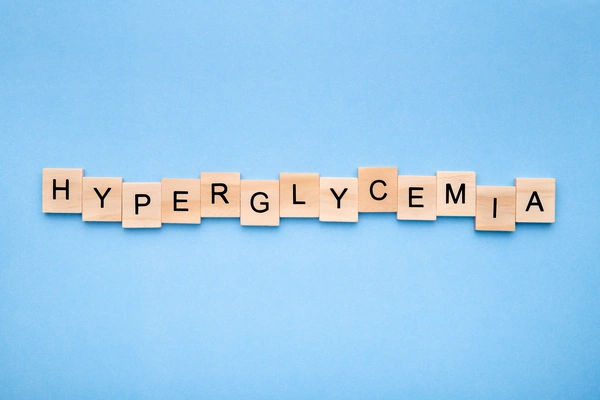Understanding Hyperglycaemia Symptoms, Causes, and Treatment
Learn about hyperglycaemia, its symptoms, causes, and treatment options. Understand how high blood sugar affects health and ways to manage it effectively.

Written by Dr. J T Hema Pratima
Reviewed by Dr. Dhankecha Mayank Dineshbhai MBBS
Last updated on 13th Jan, 2026

Introduction
Hyperglycaemia, or high blood sugar, is a common health concern, especially for people with diabetes. However, it can also affect those who are unaware they have the condition. If left untreated, hyperglycaemia can lead to serious complications. This article will help you understand what hyperglycaemia is, its symptoms, causes, and how to manage it effectively.
What is Hyperglycaemia?
Hyperglycaemia occurs when there is too much glucose (sugar) in the blood. Normally, insulin (a hormone produced by the pancreas) helps regulate blood sugar levels. But when the body doesn’t produce enough insulin or doesn’t use it properly, sugar builds up in the bloodstream, leading to hyperglycaemia.
Consult an Endocrinologist for the best advice
Common Symptoms of Hyperglycaemia
Recognizing the signs early can help prevent complications. Symptoms may develop slowly, so it’s important to pay attention to how you feel. Common signs include:
• Increased thirst and dry mouth
• Frequent urination
• Fatigue or feeling very tired
• Blurred vision
• Headaches
• Slow-healing cuts or infections
• Unexplained weight loss
If you experience these symptoms frequently, it’s best to consult a doctor.
What Causes Hyperglycaemia?
Several factors can contribute to high blood sugar levels, including:
1. Diabetes (Type 1 or Type 2) – The most common cause, where the body either doesn’t make insulin (Type 1) or doesn’t use it effectively (Type 2).
2. Poor Diet – Eating too many sugary or high-carb foods can spike blood sugar.
3. Lack of Physical Activity – Exercise helps the body use glucose for energy. Inactivity can lead to sugar buildup.
4. Stress or Illness – Physical or emotional stress can raise blood sugar levels.
5. Medications – Some medicines, like steroids, can increase blood sugar.
6. Missing Insulin or Diabetes Medication – Skipping doses can lead to uncontrolled sugar levels.
How Does Hyperglycaemia Affect Health?
If not managed properly, prolonged high blood sugar can damage vital organs and lead to complications such as:
• Nerve damage (neuropathy) – Tingling, numbness, or pain in hands and feet.
• Kidney damage (nephropathy) – Leading to kidney disease or failure.
• Eye problems (retinopathy) – Risk of vision loss or blindness.
• Heart disease and stroke – High sugar levels increase the risk of cardiovascular issues.
• Slow wound healing – Increases the risk of infections, especially in feet.
How to Manage Hyperglycaemia
The good news is that hyperglycaemia can be controlled with lifestyle changes and proper medical care. Here are some effective ways to manage it:
1. Monitor Blood Sugar Regularly
• Use a glucometer to check sugar levels at home.
• Keep a log to track patterns and share with your doctor.
2. Follow a Balanced Diet
• Eat more fibre-rich foods – Whole grains, vegetables, and legumes help stabilize blood sugar.
• Choose healthy proteins – Fish, lean meats, tofu, and nuts.
• Avoid sugary drinks and processed foods – Sodas, candies, and white bread can cause spikes.
• Control portion sizes – Eating smaller, frequent meals helps maintain steady sugar levels.
3. Stay Active
• Regular exercise (walking, yoga, swimming) helps lower blood sugar naturally.
• Aim for at least 30 minutes of moderate activity most days.
4. Take Medications as Prescribed
• If you have diabetes, follow your doctor’s advice on insulin or oral medications.
• Never skip doses without consulting your healthcare provider.
5. Manage Stress
• Practice relaxation techniques like deep breathing, meditation, or hobbies you enjoy.
• Get enough sleep (7-8 hours per night) to help regulate hormones.
6. Stay Hydrated
• Drinking water helps flush out excess sugar through urine.
When to Seek Medical Help
If you experience severe symptoms like:
• Extreme thirst and dry mouth
• Confusion or dizziness
• Nausea and vomiting
• Difficulty breathing
Seek emergency care, as these could indicate diabetic ketoacidosis (DKA), a life-threatening condition.
Preventing Hyperglycaemia
Prevention is always better than cure. If you’re at risk for diabetes or already diagnosed, these steps can help:
• Get regular health check-ups – Early detection helps in better management.
• Maintain a healthy weight – Obesity increases insulin resistance.
• Educate yourself – Learn about diabetes and how to manage it effectively.
Final Thoughts
Hyperglycaemia is manageable with the right knowledge and care. By making small, consistent changes in diet, exercise, and medication adherence, you can keep your blood sugar in check and live a healthier life. If you have any concerns, reach out to a healthcare professional for guidance.
Consult an Endocrinologist for the best advice
Consult an Endocrinologist for the best advice

Dr. Anand Ravi
General Physician
2 Years • MBBS
Bengaluru
PRESTIGE SHANTHINIKETAN - SOCIETY CLINIC, Bengaluru

Dr. E Prabhakar Sastry
General Physician/ Internal Medicine Specialist
40 Years • MD(Internal Medicine)
Manikonda Jagir
Apollo Clinic, Manikonda, Manikonda Jagir
(150+ Patients)

Dr. Shruthi B
Endocrinologist
20 Years • MBBS,MD ( GEN MED) DM (ENDOCRIONOLOGY)
Bengaluru
Apollo Clinic, JP nagar, Bengaluru

Dr. Chaithanya R
Internal Medicine Specialist Diabetologist
16 Years • MBBS, MD Internal Medicine, Fellowship in Diabetes(UK), CCEBDM(PHFI)
Bangalore
Apollo Clinic Bellandur, Bangalore
(75+ Patients)
Aditya Singh
Endocrinologist
8 Years • MBBS
Bengaluru
Apollo One Electronic City, Bengaluru
Consult an Endocrinologist for the best advice

Dr. Anand Ravi
General Physician
2 Years • MBBS
Bengaluru
PRESTIGE SHANTHINIKETAN - SOCIETY CLINIC, Bengaluru

Dr. E Prabhakar Sastry
General Physician/ Internal Medicine Specialist
40 Years • MD(Internal Medicine)
Manikonda Jagir
Apollo Clinic, Manikonda, Manikonda Jagir
(150+ Patients)

Dr. Shruthi B
Endocrinologist
20 Years • MBBS,MD ( GEN MED) DM (ENDOCRIONOLOGY)
Bengaluru
Apollo Clinic, JP nagar, Bengaluru

Dr. Chaithanya R
Internal Medicine Specialist Diabetologist
16 Years • MBBS, MD Internal Medicine, Fellowship in Diabetes(UK), CCEBDM(PHFI)
Bangalore
Apollo Clinic Bellandur, Bangalore
(75+ Patients)
Aditya Singh
Endocrinologist
8 Years • MBBS
Bengaluru
Apollo One Electronic City, Bengaluru

.webp)